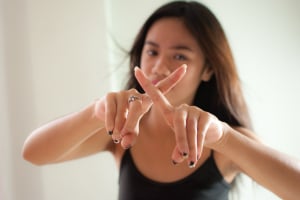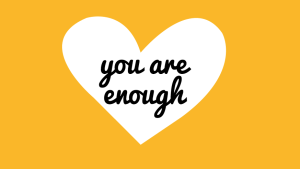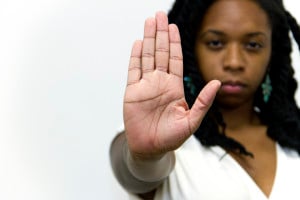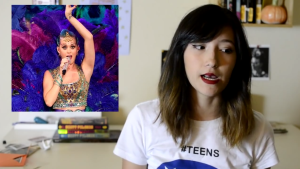
Source: Belle of the Bullshit
Originally published on Adios Barbie, and cross-posted here with their permission.
“So? How do you attract women, then?”
I let out one of those awkward laughs that sound more like blurting out surprise.
“I’m serious,” my friend wailed, seeming embarrassed for having asked. She broke off a piece of the brownie that we were sharing and stuffed it into her mouth, a look of defeat on her face.
“I don’t know.”
Her head cocked, she raised an eyebrow at me.
“I don’t! I mean, there are some things that you can do,” I explained.
“For instance,” I went on, “I used to wear a ring that had a little pink triangle on it. It was one of those it-takes-one-to-know-one kinds of things, so I could flash the ring if I was trying to flirt with the girl at the coffee shop.
“Or,” I continued, “another way to get around it is just to hang around lesbians. Then you know at least that everyone around you is into girls.”
I stopped to crush some ice with my teeth, the shards splitting in my mouth, shattering across my tongue. “Make some more lesbian friends.”
My friend let out a sigh.
And as someone who spent her high school and college years being sure to secure rainbow pins onto her bag and proudly wearing “I Kiss Girls” t-shirts in hopes of attracting the right attention, I can’t blame my friend for her frustration.
With my wild, long curly hair and perfectly and permanently applied black liquid eyeliner (atop, of course, shimmery bronze eye shadow), I am not the poster child queer woman.
Pastel sundresses, lacy push-up bras, and vanilla-flavored lip gloss would not, as it were, come as accessories with Stereotypical Lesbian Barbie – if there ever were such a thing (let’s be honest, though: for us, all of our Barbies were lesbians).
Instead, femmes are the surprises.
Femmes are the ones who are asked, rather rudely, how we can possibly be queer-identified if we paint our nails.
We’re the ones who have to fight to be noticed for who we are.
In their brilliant, stunning, perfect poem “To All of the Kick-Ass, Beautiful, Fierce Femmes Out There,” queer writer and performer Ivan Coyote says, in a touching, brutally honest way:
“Sometimes, you are invisible. I have no idea what this must feel like, to pass right by your people and not be recognized, to not be seen.”
Femme invisibility is, indeed, a problem within the community, and there is no easy way to get around it.
Queer women are a group of people who have, for years, fought to subvert the dominant paradigm in an attempt to be allowed to love and express themselves freely.
And, as is consistent with other subcultures, we have therefore adopted our own norms: our own clothes, our own lingo, our own identities (and sub-identities, and sub-sub-identities: “I’m a high-femme who dates exclusively butches and soft-studs, but there was one time when I slept with an androgynous chick who now identifies as a boi…”).
And as queerness became more than just a sexual orientation and grew to include a political affiliation and social movement, it became more important to find ways to set the community apart from society at large.
Our foremothers did this by adopting those similar characteristics, by ensuring that what we had in common – our clothes, our lingo, our identities – couldn’t be touched by the outside world.
The problem is, those characteristics didn’t include high heels and false lashes.
If anything, those preferences were pushed out of the boundaries of queer womanhood altogether.
And even though high-tops and snapbacks now are considered “lesbian en vogue” (what is up with that?), the same problem remains: Queer women are “supposed” to look a certain way.
In fact, an article by Style.com, detailing the hot trends for spring, went as far as to say that lesbian chic might be “here to stay,” implying that there is a definitive lesbian style.
And according to the piece, the tell-tale fashion sign that someone is a lesbian is combat boots – how clever!
This editorial faux pas just proves that if you don’t fit the stereotype, then you might as well be straight – a sentiment echoed in our own damn community.
Unfortunately for a femme, this fight doesn’t get any easier depending on whether you’re in the company of queer folks or out in society at large. Femmes are almost always overlooked.
And sometimes, this works to our advantage.
Femmes are, of course, afforded the most social privilege in the marginalized group of queer women.
We are not immediate targets for verbal harassment, physical violence, or other explicit homophobia the way that more supposedly “visually obvious” queer women are.
At job interviews and family reunions, we don’t have to worry about sideways glances. We don’t have to think up explanations ahead of time, deciding whether or not to shame our mothers by telling others the truth behind why no, we still don’t have a boyfriend.
With femmes, no one asks.
We are free to be who we are—or who they think we are—because we look the way that we’re expected to. We conform to society’s female gender presentation box.
We don’t make people nervous.
But that also means that we are subject to, as Coyote puts it, “coming out of the closet – again and again, over and over, for the rest of your life.”
Because whether we are “at school, at work, at [our] kid’s daycare, at [our] brother’s wedding, [or] at the doctor’s office,” there is always someone who we think we should tell.
Maybe it’s our favorite co-worker, or maybe it’s the dental hygienist who always asks if there’s a new man in our life. Maybe, like me, it’s the high school students that we teach who keep wondering why they see us so often with another woman.
Being femme means constantly contemplating who to come out to and when—because no one affords us the benefit of hesitating before expressing the assumed pronoun of who we’re dating. It doesn’t even occur to them.
And that’s not to say that we have it worse or harder. Oh no. I’m definitely not saying that.
What I’m saying is that we have it differently, and that being ignored, being assumed to be something else, is equally as offensive and homophobic, stereotyping and discriminatory, as the rude glances and comments and punches thrown at our more studly counterparts.
It’s another side of the same coin, whether the offense is coming from a well-meaning straight person or in the form of a joke from someone in our community.
Our gender presentations shouldn’t be mocked any more than our sexual orientations should.
And so to all of you (yes all of you) kick-ass, beautiful, fierce femmes, out there, remember this one striking line from Coyote’s poem:
“You fight homophobia in a way that I never could.”
So keep on fighting.
Keep proving that there is no right way to look like or be a queer woman.
And if in the midst of all that fighting you have a minute to let me know which lipstick shades are hot for spring, could you tweet it to me?
[do_widget id=‘text-101′]
Melissa A. Fabello, Managing Editor of Everyday Feminism, is a domestic violence prevention and sexuality educator, eating disorder and body image activist, and media literacy vlogger based out of Philadelphia. She enjoys rainy days, Jurassic Park, and the occasional Taylor Swift song and can be found on YouTube and Tumblr. She holds a B.S. in English Education from Boston University and an M.Ed. in Human Sexuality from Widener University. She can be reached on Twitter @fyeahmfabello. Read her articles here and book her for speaking engagements here.
Search our 3000+ articles!
Read our articles about:
Our online racial justice training
Used by hundreds of universities, non-profits, and businesses.
Click to learn more




















